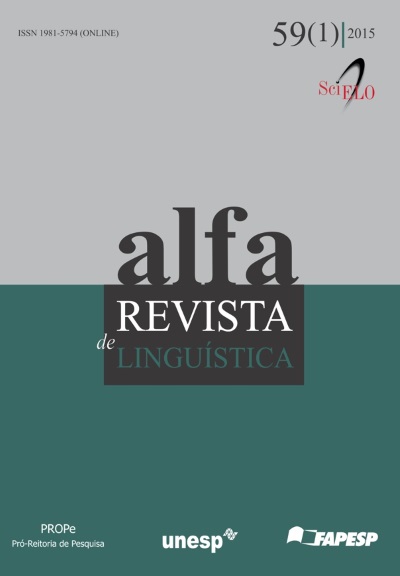Study of the linguistic variation of rhotics in Campinas native accent
DOI:
https://doi.org/10.1590/1981-5794-1502-6Keywords:
Linguistic variation, Rhotics, Acoustic phonetics,Abstract
This article presents the results of a research study that investigated a variation in a linguistic segment of the Campinas native accent found in the city of Campinas, SP, Brazil: the /R/ in the syllabic coda position. The hypothesis that guided this research is that the rhotic in the Campinas native accent is in a more advanced state in relation to its attenuation than in speech in other towns in the interior of São Paulo state, causing it to be either vocalized or erased. This attenuation would account for the auditory impression of the study’s informants, who believe they utter a variation of /R/ assessed as ‘intermediate’ and which they view as proper to Campinas native accent. The selected corpus comprises data collected from twelve informants from the interior of the state of São Paulo. The data were recorded and analyzed acoustically and statistically. The theoretical foundation adopted was that of Fant’s Acoustic Theory of Speech Production (1960) in conjunction with a sociolinguistic framework. The results show that there is linguistic variation of the rhotic and that the most frequent variety is the caipira /R/. These findings contradict the alleged existence of an /R/ characteristic of Campinas native accent.Downloads
Download data is not yet available.
Downloads
Published
23/02/2015
How to Cite
LEITE, C. M. B. Study of the linguistic variation of rhotics in Campinas native accent. ALFA: Revista de Linguística, São Paulo, v. 59, n. 1, 2015. DOI: 10.1590/1981-5794-1502-6. Disponível em: https://periodicos.fclar.unesp.br/alfa/article/view/4910. Acesso em: 4 feb. 2026.
Issue
Section
Papers
License
Manuscripts accepted for publication and published are property of Alfa: Revista de Linguística. It is forbidden the full or partial submission of the manuscript to any other journal. Authors are solely responsible for the article's content. Translation into another language without written permission from the Editor advised by the Editorial Board is prohibited.

